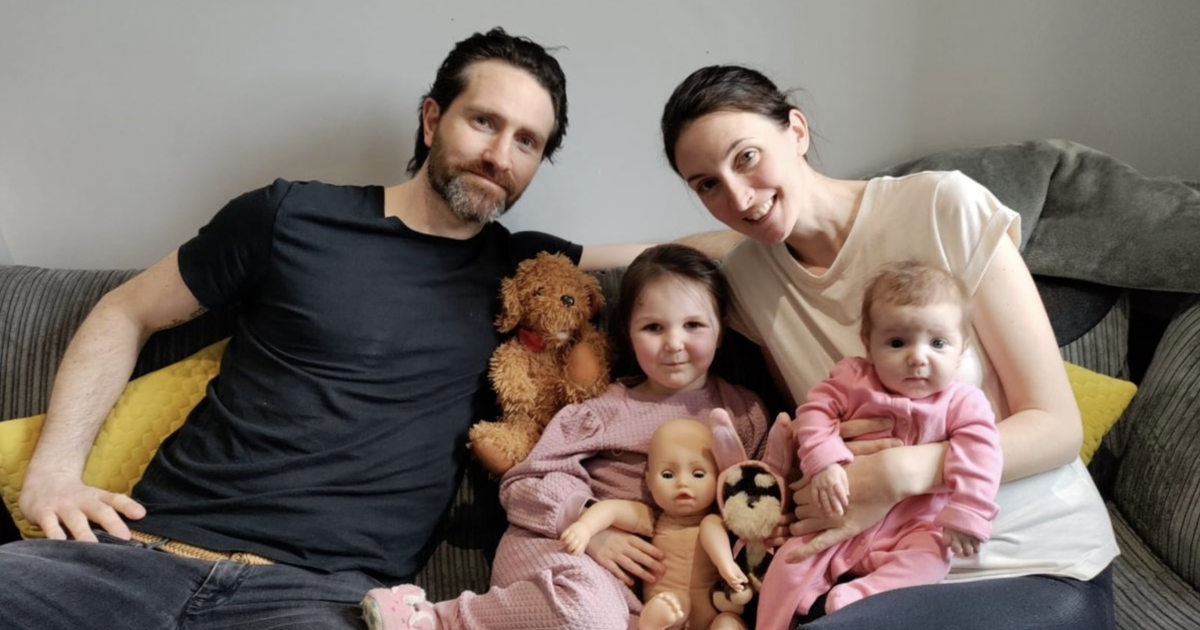A Father Vows to Spend More Time With His Girls Facing Childhood Cancer and a Rare Disorder
Cancer in children can put so much stress on a family. But for a father in County Durham, England, having one child with childhood brain cancer and another with a rare condition made him focus all the more on one thing: spending time with his little girls.
Matt Shaw, 39, left his role as a financial analyst and unhesitatingly turned down a job offer worth more than $200,000. The reason for this was that he wanted to be near his wife, Tracy, 33, his 5-year-old child, Sophia, who is battling brain cancer, and his 3-month-old baby, Delilah, who is battling a rare condition called hyperinsulinism.
“Before this, I was booming in my career and during the pandemic I was offered a job in London that would have paid around £200,000 but I just couldn’t handle it,” he said. “The only positive thing about this whole process is that it has taught me how precious time is with my family, and to be brutally honest, I don’t know how much time I have left with them.
“You can’t put a price on the memories you make with your kids.”
His little girl, Sophia, previously beat a brain tumor diagnosis that arrived after she complained of a headache. She had successful surgery when she was only 3 years old, but now the cancer has returned in her spine.
Doctors have told the family it’s “just a matter of time”, but her parents are determined to keep fighting for their little girl. They’ve started a GoFundMe page to raise money for a variety of treatments that hopefully can fight cancer.
“We want to try to keep life as normal for Sophia as possible so we don’t show too much what’s happening and we have to be brave ourselves,” Shaw said. “The doctors say they can’t do anything for Sophia this time, but we refuse to accept that the cancer will win this battle.”
In addition, the family also cares for their youngest child, Delilah, as she contracted a rare disease that left her with higher than normal levels of insulin in her blood. According to The Mirror, she needs to be fed every three hours or she can become fatally weak.
“I asked the doctor what are the chances of this happening. You know the cancer comes back but in a different part of Sophia’s body and then Delilah is diagnosed with this condition,” Shaw said. “He shook his head and said ‘it’s billions to one’, he said ‘I can’t put a number on it’, one of these things that happen is rare enough in itself.”
But despite the incredible chance of these simultaneous battles happening among his children, Shaw won’t give up hope.
“The thought of living in this world without one of my little girls is just not an option,” he said. “We will do everything we can to see them both grow up and start their own families.”
What is Hyperinsulinism?
Hyperinsulinism is a rare and complex condition that can cause moderate or severe hypoglycemia (low blood sugar) in infants and children. The condition can be a temporary or permanent one, according to UCLA Health.
In people with hyperinsulinism, the insulin-producing beta cells of the pancreas do not work properly because these cells normally only release insulin when a person ingests carbohydrates or proteins. But hyperinsulinism means that these cells produce too much insulin, which in turn leads to hypoglycemia, as insulin lowers blood sugar levels.
Hyperinsulinism can be caused by several factors:
Babies can develop hyperinsulinism if the mother has gestational diabetes or experiences significant stress in the womb. It could be genetic. Hyperinsulinism can be a part of other conditions such as Beckwith-Weidemann or Kabuki syndrome.
What are brain tumors?
According to the American Society of Clinical Oncology (ASCO), brain tumors account for 85 to 90 percent of all primary central nervous system (CNS) tumors. The central nervous system is made up of the brain and spinal cord and acts as the main “processing center” for the nervous system. The normal function of the brain and spinal cord can become difficult if a tumor is present that puts pressure on or spreads to nearby normal tissue.
Can cell phones and 5G cause cancer? A Leading Brain Cancer Doctor Says “No”
There are many different types of brain and spinal cord tumors. Some are more likely to spread to nearby areas of the brain or spinal cord than others. Slow-growing tumors may be considered benign (non-cancerous), but even these tumors can cause serious problems.
General Symptoms of Brain Tumors
Symptoms of brain tumors as a whole are often caused by increased pressure within the skull. This pressure can be caused by tumor growth, swelling in the brain or blockage of cerebrospinal fluid (CSF), according to the American Cancer Society.
RELATED: What Is Bruce Willis’ Shocking Diagnosis Of “Aphasia” And Could It Be Cancer Linked?
General symptoms may include the following:
Headache Nausea Vomiting Blurred vision Balance problemsPersonality or changes in behavior Seizures Drowsiness or even coma
However, it is important to note that these symptoms are not exclusive to brain tumors. Nevertheless, you should always consult your doctor if any health problems arise.
Understanding cancer in children
Advances in treatment over the past few decades have resulted in 84 percent of children with cancer now surviving five years or more, according to the American Cancer Society. This is an increase of 58 percent compared to the mid-1970s.
RELATED: Chemotherapy’s Long-Term Effect on Kids: 8-Year-Old Boy Scout Phenomenon Lilly Bumpus Beat Cancer Like a Baby, But Still Deals Brutal Treatment Side Effects
But according to the National Pediatric Cancer Foundation, more than 95 percent of childhood cancer survivors have serious health problems because of current treatment options, and only 4 percent of the billions of dollars spent on cancer research and treatments each year go toward treating childhood cancer in the United States. United States. Since 1980, fewer than 10 drugs have been developed for use in children with cancer, while hundreds of drugs have been developed exclusively for adults.
dr. Elizabeth Raetz, director of pediatric hematology and oncology at NYU Langone’s Perlmutter Cancer Center, reminded us in an earlier interview that there is still reason for hope.
“There are also targeted treatments and different immunotherapies that have been studied in adults and have now moved into clinical trials for children and there is a lot of excitement in the community about that,” Dr. Raetz to SurvivorNet.
Still, navigating a child’s cancer diagnosis can be tricky.
Jayne Wexler’s son battled acute lymphoblastic leukemia and is now dealing with heart disease as a side effect of chemotherapy. In an earlier interview with SurvivorNet, Wexler explained that in addition to the regular worries of parents, having a child with cancer means living with a whole new world of fears.
The Impact of a Childhood Cancer Diagnosis on the Whole Family Jayne Wexler Shares Her Story
“My husband and I will always have anxiety,” she said. “I don’t think we can ever let that go. Just when he was fine, he had a relapse, and then he had the bone marrow transplant… so there’s always kind of a concern.
RELATED: “I Try to Stay Strong, But Sometimes You Have to Cry”: Playing the Role of Cancer Caregiver and Mother
Wexler admits that she tries to live for every day, but understandably it doesn’t always come easy.
“And I try — you hear people say this — that we should live each day and be grateful for what we have,” Wexler said. “And it’s hard to remember that when you’re being overtaken … it’s very hard to just enjoy the moment because we just don’t know what’s going to happen in the future.”
Learn more about SurvivorNet’s rigorous medical assessment process.


Comments are closed.